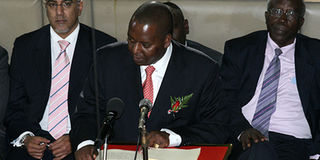Kimunya sought to have MPs pay tax and paid a heavy price

Photo/FILE
Mr Amos Kimunya reads the budget for the 2008/2009 financial year in Parliament in June 2009. During his tenure as Finance minister, Mr Kimunya supported the plan for the government to have a stake in De La Rue.
Transport minister Amos Kimunya was the first Finance minister who sought to have MPs pay tax on their allowances.
Mr Kimunya asked MPs to pay tax on their perks when he read the Budget way back in 2006. The MPs, keen to protect their earnings, ganged up and rejected the proposal.
Mr Kimunya had asked them, through that year’s Finance Bill, to amend the National Assembly Remunerations Act so that the country could raise enough money to support economic growth. He was rebuffed.
Come 2008, Mr Kimunya was back at it again. The MPs held a grudge against him.
So, when they found out that he had engineered the secret sale of the Grand Regency Hotel, they passed a vote of no-confidence against the minister.
It was the first vote of no-confidence against a Kenyan minister in a long time.
The fact is that, as the MPs focused on the debate against taxation, they forgot that there could be dubious money being paid out to white elephants such as the KenRen fertiliser factory which was not built.
The payments to KenRen are scheduled to end in 2015.
Still, if the MPs had not focused so much on the taxation debate, the Grand Regency saga — which was so much in the news — wouldn’t have happened.
Then came Mr Uhuru Kenyatta. He proposed the taxation in 2009. There was so much debate about the matter and the public became hostile to MPs.
But two MPs in Johnstone Muthama and Peter Kenneth volunteered to pay tax to sidestep the public ire.
Public pressure
To tame public pressure on the lawmakers, House Speaker Kenneth Marende constituted a tribunal to review the pay of MPs and also to look at the viability of the current MPs paying tax on their allowances.
The tribunal was chaired by retired appellate judge Akilano Akiwumi.
When the report came back, the tribunal recommended an increase in the MPs’ salaries to 1.1 million, and proposed that they should be taxed on all the perks they earn, such that the net increase of their pay would be Sh12,000.
Of course, having been cushioned against a loss of income if taxation is effected, the MPs adopted the report in June 2010 and asked Finance minister Uhuru Kenyatta to make sure that it was implemented “immediately”.
But Mr Kenyatta who for the first time had presented a Sh1 trillion budget, was grappling with the numbers and asked Parliament to give him time to implement their resolution.
The House gave the minister an indefinite extension, after an understanding that the MPs’ pay won’t be touched by the taxman until the 11th Parliament.
The MPs also got a letter from the Kenya Revenue Authority, an opinion of the Attorney General, and the word of the President that even with the new Constitution, their perks were still safe.
But now, KRA has struck and the lawmakers have to pay. Some have threatened to go to the Supreme Court to state their case against the taxation.



